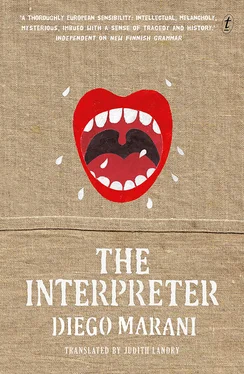Sometimes, on my way home, it seemed to me that Irene had been back, that she’d come to look for me while I was out. I went through every room in the house, following imaginary traces of her passing, but all that I found was the dull whiteness of dust on the parquet, the stale scent of my lost peace of mind lingering in some corner. In her pursuit, I combed the city from side to side; I called all the numbers in the little notebook she’d left beside the phone, only to be answered by hairdressers closed for the holidays, cabinet-makers, junk shops, the tinny tones of answerphones in empty flats. I even phoned some relatives of hers in Zurich; her cousin told me she’d gone back to Canada, but no, he didn’t have her address; his hesitant tone made me suspect that he was seeking advice from someone else in the room, and I had the sudden feeling that Irene was there, right next to him, prompting him as to what to say. I was assured that he would give her my message, that he would let me know her address in Canada, but while I was dictating my own address into the receiver I had the distinct feeling that it was not being taken down; her cousin seemed very eager to hang up, saying goodbye evasively and with false courtesy. I called the number again many times over the following days, at various times of the day and night; it was answered just once, after many rings, late that same August, by an irritated-sounding maid, who told me in German that there was no one home, they’d all gone to the seaside.
Whole days would go by without my saying a word to a soul; I was surprised to learn how long one could live without speaking. I’d say ‘Good morning’ to the caretaker in the office, the odd ‘sorry’ to someone on the tram, a ‘thank you’ in the bar, and it would already be evening. The trees were turning with the first heavy rain, the nights were becoming dark again; less dramatic dawns would reveal a steely sky which sent a fine white dust raining down onto the city, and the lake was puckered with cold wrinkles, which broke up on the shore like the laboured breath of a sick man. Voices rang out again in office corridors and the streets were bright with headlamps of an evening. I started work again, and within the shelter of my room the grip of solitude eased up a little; in there, time could flow over me without harming me. But as soon as I was out again on the street, I felt myself short of breath, each corner like a dagger of anguish planted in my back. I’d try to spin out my journey, to put off the moment when I’d have to turn the key in the lock and be enveloped by the darkness of those empty rooms. I’d wander from one pavement to another, sometimes suddenly changing direction to escape my goal, and I had the feeling that the people around me noticed my odd behaviour and looked at me suspiciously, as though I were a beggar.
It happened for the first time on a Saturday afternoon, and in the moments that followed I truly felt that each man and his destiny are two sworn enemies whom only death will part; only one of the two can go on living, the other must succumb. The fight is not only desperate, it is also unequal; it may go on for years, or draw to a lightning close. Yet there are men who manage to floor their mortal double and clear the way for their own existence. I am not one of them: I died that day, and the person who is writing this is a mere ghost. I’d gone into a baker’s to buy my usual loaf of bread, but instead of the words I had intended to produce, what came out of my mouth was incomprehensible blather. At first I thought I was just out of practice, that my long periods of silence had weakened my powers of conversation; in the office I’d already noticed my voice becoming hoarse after just a few moments dictating to my secretary. So I simply gave the puzzled shopgirl an embarrassed look and tried repeating my request. In my efforts to speak clearly, I felt my throat knotting up; between the words I was so clumsily pronouncing, I gave out a long rasping sound like that of a whimpering dog. Eyes wide with terror, I backed off towards the door and left the shop, making brusque gestures of refusal to the alarm-stricken shopgirl, who was still firmly proffering me my loaf of bread. I ran off like a murderer, my throat paralysed by fear, turning around every so often to look back at the by now distant baker’s to check that no one was coming after me, that people were not stopping to point at me as I passed. When I got home, I rushed up, panting, to the bathroom mirror: what I saw reflected before me was not my usual gaunt face, but one with the glassy eyes of a fish, a foam-flecked mouth like the jaws of a wild beast, and the rough and scaly skin of a reptile — a constant succession of metamorphosing animals, not one of them containing anything of my original self. I drew what breath I could and bared my teeth to pronounce my name: ‘Felix Bellamy! I’m Felix Bellamy, born in Geneva on June 13th 1950!’ I shrieked at the top of my voice, and only then did I burst into tears. Terrible days followed: I no longer dared to speak. In the office I pretended to have lost my voice, I addressed my secretary in monosyllables, or using words I’d cautiously tried out beforehand, outside the door. At home in the evenings I’d read out loud from some work document, to see how serious the problem was — I could feel it spreading ominously within me. Inevitably it would recur: just when I felt the warm flow of words running evenly and freely from my throat, suddenly they would crumble into contorted syllables, become guttural stuttering sounds, then whistles. I tried to resist this transformation with all my might, twisting my neck, raising my chin, grinding my teeth, thrusting my tongue vainly backwards to free it from the knot which was throttling it at its root. But in the end all that remained of my voice was a raucous shout, gurgling like vomit from some unknown breach in my glottis. It all happened almost without my noticing, as though some other being had taken temporary possession of my mouth to use it as its own — some unknown and monstrous being which had made its way into my body and was struggling laboriously to come out into the world.
It didn’t take me long to realise what had happened. I was ill, I could no longer hide the fact. The illness that had found its home within me was a parasite, a sort of fungus, an unthinking worm, made up of merciless cells which would devour me if I did not have some recourse to action. But was it not already too late? After much hesitation, remembering the psychiatric report attached to his medical notes, I decided to go to the archives and look for the file on the interpreter. I wanted to track down the specialist who had diagnosed his illness and put myself in his hands — before it was too late, for me as well. On the last page of the file I found the name and address of Dr Herbert Barnung, a German expert who had done years of research into language disorders.
I left for Munich one muggy day in late summer. The airport was extremely quiet; the girls at the cash desks in the duty-free shops were twirling around on their stools, underemployed, shoes off, scratching one heel with the big toe of the other foot, and inspecting their nails. In the corridors leading to the flight decks, the only sound was the customs men’s radios crackling behind the plate glass of their cabins. Once I’d boarded the plane, the mood seemed to be one of intense expectation: peering at the faces of the other passengers, absorbed in their newspapers, I had the impression that we were all going to see Dr Barnung. His consulting room turned out to be in the new part of the city, at the edge of extensive woods and lawns dotted with flowerbeds. What I particularly remember of that warm and sunny afternoon is the outline of a cat crouching on the sill behind the tinted glass of a window giving onto the garden, the long shadows cast on the wall by the seats in the waiting room, the old magazines on the table and Dr Barnung himself, thin and pale in his white gown, coming towards me and holding out his hand, yet at the same time somewhat forbidding, with the spare look of a military man used to a frugal life style. He had hard features, prominent cheekbones, a high, freckled forehead; behind his clear blue eyes I sensed the shadow of distant trouble, the force of an iron will. His consulting room had heavy wooden panelling and dark, heavy furnishings; on the walls, in ornamental metal frames, were large prints of birds of prey. Clasping his long white hands together and rubbing them along the table, he listened attentively to my tale of woe. When I embarked on the unlikely story of the interpreter and his secret language, contrary to my expectations, he neither interrupted me nor seemed to become impatient. He read carefully through the pages on which I had written out the meaningless words that punctuated my nightmares, pausing for thought, knitting his thick reddish eyebrows; at times he would glance up from his reading and scan my face with an impassive look. I was not to have long to describe my problems, however, because I soon found myself beginning to stammer out my gibberish in front of him as well; my tongue became glued to my palate, and when at last I managed to loosen it from the grip of the cramp that had mysteriously assailed it, I found my throat seizing up, driving out the air I was vainly drawing in from my lungs in my efforts to articulate my words, yet turning them into nothing more than warbling babble. Alarmed, Dr Barnung put a finger to his lips, then appeared to smile, perhaps the smug smile of a professional who has identified the problem. He wrote some notes in minuscule handwriting, glancing up occasionally in fascination to observe the spasmodic contractions of my face as he did so. But when at last he spoke, his expression was impenetrable and his voice grave.
Читать дальше












